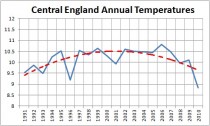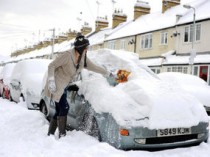By Laura Caroe, Daily Express
BRITAIN is set to suffer a mini ice age that could last for decades and bring with it a series of bitterly cold winters.

Central England Annual temperatures since 1991
And it could all begin within weeks as experts said last night that the mercury may soon plunge below the record -20C endured last year. Scientists say the anticipated cold blast will be due to the return of a disruptive weather pattern called La Nina. Latest evidence shows La Nina, linked to extreme winter weather in America and with a knock-on effect on Britain, is in force and will gradually strengthen as the year end.
The climate phenomenon, characterised by unusually cold ocean temperatures in the Pacific, was linked to our icy winter last year - one of the coldest on record. And it coincides with research from the Met Office indicating the nation could be facing a repeat of the “little ice age” that gripped the country 300 years ago, causing decades of harsh winters. Britain is set to suffer a mini ice age that could last for decades. (see this PDF that describes the UV as an important ‘amplifying’ factor in the solar impact on climate.

The prediction, to be published in Nature magazine, is based on observations of a slight fall in the sun’s emissions of ultraviolet radiation, which may, over a long period, trigger Arctic conditions for many years.
Although a connection between La Nina and conditions in Europe is scientifically uncertain, ministers have warned transport organisations and emergency services not to take any chances. Forecasts suggest the country could be shivering in a big freeze as severe and sustained as last winter from as early as the end of this month.
La Nina, which occurs every three to five years, has a powerful effect on weather thousands of miles away by influencing an intense upper air current that helps create low pressure fronts.
Another factor that can affect Europe is the amount of ice in the Arctic and sea temperatures closer to home.
Ian Currie, of the Meterological Society, said: “All the world’s weather systems are connected. What is going on now in the Pacific can have repercussions later around the world.”
Parts of the country already saw the first snowfalls of the winter last week, dumping two inches on the Cairngorms in Scotland. And forecaster James Madden, from Exacta Weather, warned we are facing a “severely cold and snowy winter”.

Councils say they are fully prepared having stockpiled thousands of tons of extra grit. And the Local Government Association says it had more salt available at the beginning of this month than the total used last winter.
But the mountain of salt could be dug into very soon amid widespread heavy snow as early as the start of next month. Last winter, the Met Office was heavily criticised after predicting a mild winter, only to see the country grind to a halt amid hazardous driving conditions in temperatures as low as -20C.
Peter Box, the Local Government Association’s economy and transport spokesman, said: “Local authorities have been hard at work making preparations for this winter and keeping the roads open will be our number one priority.”
The National Grid will this week release its forecast for winter energy use based on long-range weather forecasts.
Such forecasting is, however, notoriously difficult, especially for the UK, which is subject to a wide range of competing climatic forces. A Met Office spokesman said that although La Nina was recurring, the temperatures in the equatorial Pacific were so far only 1C below normal, compared with a drop of 2C at the same time last year.
Research by America’s National Oceanic and Atmospheric Administration showed that in 2010-11 La Nina contributed to record winter snowfalls, spring flooding and drought across the world. Jonathan Powell, of Positive Weather Solutions, said: “The end of the month and November are looking colder than average with severe frosts and the chance of snow.” However, some balmy autumnal sunshine was forecast for this week.




